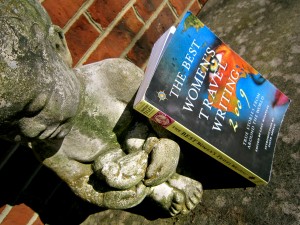Maybe it's my interest in Mexico. Maybe the fact that Pamela made me laugh out loud. But I think one of the main attractions I had to this tale was the perspective of the author and her choice to not describe a place just as everyone can. She took her personal connotations of San Miguel de Allende and illustrated its energy by taking the reader on a journey through her heart palpitations without the plain Jane explanations of where you are and what's going on. She assumes you can figure out the essentials between the lines of her prose.
It may come with the territory of exposing quite a bit of yourself in your writing. Pamela speaks to the reader as though they understand her sarcasm - just like an old friend would. Wouldn't it seem weird to talk about a romantic evening with a studly, foreign man and then hold back in a bubble of formality? I guess that's my interest; I like people who open up and tell it the way they experience it, not the way others expect to hear it.
Big Cats, No Guns
by Laurie McAndish King
In Africa, life is good - when you're not on the menu.
This story was much more about the substance than the voice. It might be the fact that she tells a relatable experience of a bush walk, but I certainly know I chuckled at this line:
'A good way of testing the freshness of dung, is to thrust your hand into the centre of it. If the dung is fresh, it will be warm inside.' Right. Life I'm ever going to employ this methodology. They didn't even provide a chart correlating temperature to time elapsed to distance traveled.
That's silly, Laurie. About as silly as the advice she relayed about walking safaris and that dreaded face-off between quivering biped and monstrously large beast. Standing your ground without a gun in your party sounds like a fool's direction, but that's the rule, so they say. And her character of Maureen with the new kicks and bright pink windbreaker walking around the African bush gave me a great visual. Illustrating her ironic presence there was as ominous as writing in a handgun in the story opener: something had to happen to that woman, especially since she apparently had an untied left shoelace.
Climaxing at a chance seen with dozens of other animals did the real trick. Great experience. Glad you lived to tell the tale, Laurie.
Lost in Jamaica
by Laurie Gough
In Negril, a town founded by hippies, the author explores its hedonistic ways.
Another Laurie! There must be something in the name that excites their travel writing to a level not often touched by most.
So here's the gist. Laurie befriends a local Jamaican woman and clicks with her family life - away from the drug tourists and resort hot tubs that muddy her prior exposure. Unfortunately, she burns her leg on the exhaust pipe of a motorbike and has to leave the authenticity of her experience to seek medical help.
And medicine she gets, albeit from a creepy old lady on the beach. We don't often picture 80 year-old women with wicker baskets to be drug pushers, which is probably why Laurie was caught off guard and couldn't deny the "somewhat pushy" entrepreneur her $2. Laurie ensues with an incredible explanation of her feelings while high as a skyscraper in Dubai. Not everyone has these sorts of travel experiences, nor does everyone necessarily want to, which is why I liked hearing her detail a mindset that frightens my curiosity.
The Bottomline























